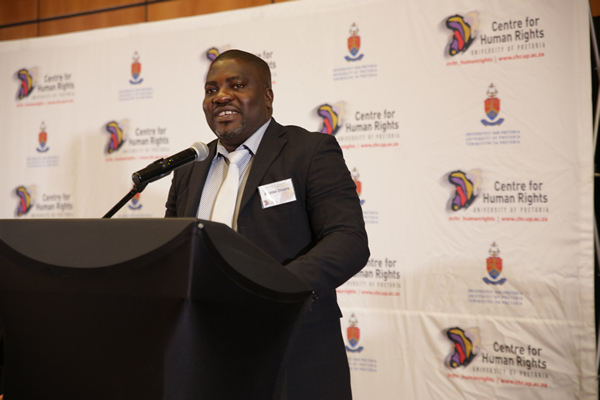In a recent Colloquium of graduates of the Centre for Human Rights, participants agreed that the greatest challenges for human rights in Africa lie in the effective implementation of rights, and the independent functioning of institutions. This event, which took place on 8 December 2016, brought together some hundred current Centre Master’s students and graduates of its various programmes under the theme “How far have we come; where do we go from here?”
Implementation of human rights norms was the focus of the first Colloquium panel. As part of this panel, a compilation of essays by graduates, tracing the impact of the African Charter on Human and Peoples’ Rights (African Charter) and the Protocol thereto on the Rights of Women in Africa (Maputo Protocol) in selected African states, was launched. (See V Ayeni (ed) The impact of the African Charter and Maputo Protocol in selected African states, PULP, 2016).
A number of Centre graduates have come together to write essays about the rights of lesbian, gay, bisexual, transgender and intersex (LGBTI) persons across Africa. These essays are coming out at the end of 2016 (in A Jjuuko and S Namwase (eds) Protecting the human rights of sexual minorities in contemporary Africa, PULP). A number of these authors shared insights about the situation of LGBTI persons on the continent. The provocative question was posed whether activism – even culminating in legal victories - has had a positive impact on the lives of LGBTI persons in countries such as Uganda.
The role of civil society received much attention, Its role at the national level has been shown to be an important factor enhancing implementation of international human rights. It was noted that two countries, in which Centre graduates are present, have no NGOs that enjoy observer status with the African Commission. These countries are Mauritius and Sierra Leone.
The human rights of women and children also received participants’ attention. Although many advances in these two domains were noted, participants agreed that there still was a long way to go. It is particularly patriarchal structures that constrain children and women in the full enjoyment of their rights. To overcome the negative influence of traditional practices, it is required to go ‘beyond the law’, to address raising levels of awareness, education and overcoming stigma.
As much as the ratification of normative frameworks is not an aim in itself, it is an important starting point. Participants noted that the Maputo Protocol has not been ratified by two countries that are often viewed as ‘leading democracies’, and in which Centre graduates or partners function. These countries are Botswana and Mauritius.
Looking at the institutional landscape for promoting human rights in African states, a strong plea was made for more attention and stronger institutions being devoted to police oversight. It is an undisputed fact that police detention is one of the most precarious situations in many African states, with cruel, degrading treatment and deaths often ensuing.
The Colloquium was a celebration of the diversity of career trajectories of Centre graduates, and the variety of thematic areas in which they engage. Inspired by the observations and insights emanating from the Colloquium, the Centre commits itself to seriously consider incorporating the following into its programmes:
- More emphasis on transitional justice
- More serious engagement with the inter-disciplinary approach, for example, by involving anthropologists and psychologists in teaching and research
- More critical thinking, with a particular focus on African-specific application of international law
- An emphasis on story-telling as a technique for teaching and advocacy.


